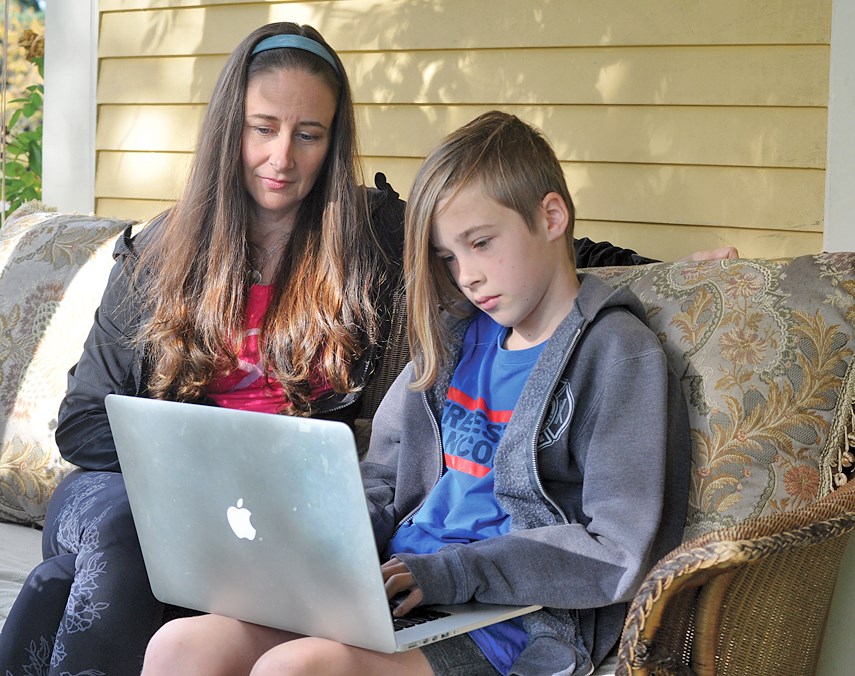North Shore families whose kids have been learning online from home during the pandemic say they’re hugely relieved after learning the program will be continued until the end of the school year in both North and West Vancouver school districts.
“It really is good news,” said Shirlee Law, a North Vancouver mom whose son Ollie has been learning online in the program since September. “I actually burst into tears. It’s such a relief.”
Since September, both local school districts have offered an online program for families who didn’t feel comfortable letting their kids go back to the classroom this fall, because of the pandemic.
That program was launched as a temporary measure designed to ease students back into the classroom.
Initially both school districts planned to end the online program in December, but later agreed to extend it until spring break. This month, both North Shore school districts announced the program will now run until the end of the school year.
Many families who opted for remote learning had either children or household members with medical conditions that make them particularly vulnerable to complications of COVID-19 and didn’t want to risk contracting it from classmates.
In her own case, treatment for breast cancer with radiation therapy has left her lungs particularly susceptible to further damage, said Law. Her story as a cancer survivor isn’t unique, she said.
“I’ve heard so many harrowing stories about why people are accessing this,” she said.
A number of families have also faced serious medical situations in the past which has left them feeling emotionally vulnerable to the threat of any additional serious illness, said Law.
In both school districts, the online learning program has been funded by one-time federal money that has gone to help schools adapt to the challenges of COVID-19. Funding has primarily gone to paying for teachers to provide online lessons as well as ensuring that school classrooms didn’t have to be re-organized partway through the year.
The online learning program is centred around language arts and math for elementary school students.
Law said in her own family’s case, they’ve developed a routine over the past few months that means her son starts in on school work at 9 a.m. like other kids in school. Sometimes that’s a supplemental French or typing lesson that Law provides or a science experiment from the school that they do as a family. For two hours in the afternoons, Ollie has online instruction. The family also tries to get up to the local ski hills one morning a week and take walks as a family for physical exercise. “That’s his P.E.,” says Law.
Most families in the program would still prefer that it include more subjects that math and language arts, said Law. “It’s hard to be a teacher when you’re not a teacher,” she said.
That’s a sentiment that other parents who are part of a Facebook support group for the program echoed.
So far, however, expanding the program doesn’t appear to be under consideration.
“Our feedback is that the model as it is, is working for people,” said Pius Ryan, assistant superintendent of the North Vancouver School District. “And so I wouldn't recommend changing it. I think if you expand it, you disrupt what is working.”
In the fall, there were over 800 kids on the North Shore learning remotely in the programs.
Since then, a number of families have opted to have their children return to regular school classrooms.
Currently there are 230 students in the North Vancouver program. In West Vancouver it’s a similar scenario, where about 40 per cent of the students originally in the program have returned to the classroom. There are 225 elementary students and 36 secondary students in West Vancouver’s program. A smaller of children in each district are also learning online under a “hospital homebound” program, originally created for children with serious illness.
Students have formed bonds among their online “classmates” and teachers have been able to offer tutorials and hold “breakout” sessions with smaller groups of kids, said Ryan.
He added some English Language Learner students who are learning online are now receiving some additional ELL support.
In voting to continue the program to the end of June, North Vancouver trustees voiced support for what has been accomplished.
“I just want to say how impressed I am about how quickly this program was mobilized, and we now have a group of teachers who are experts in online learning, which I think is a huge positive,” said Trustee Mary Tasi-Baker.
Law said for her family, the key for her son going back to school will be when she is able to receive a vaccine. Her son is already looking forward to that day, she said.
“I’ll still feel there’s a risk,” she said. “But we can’t live alone for the rest of our lives.”


